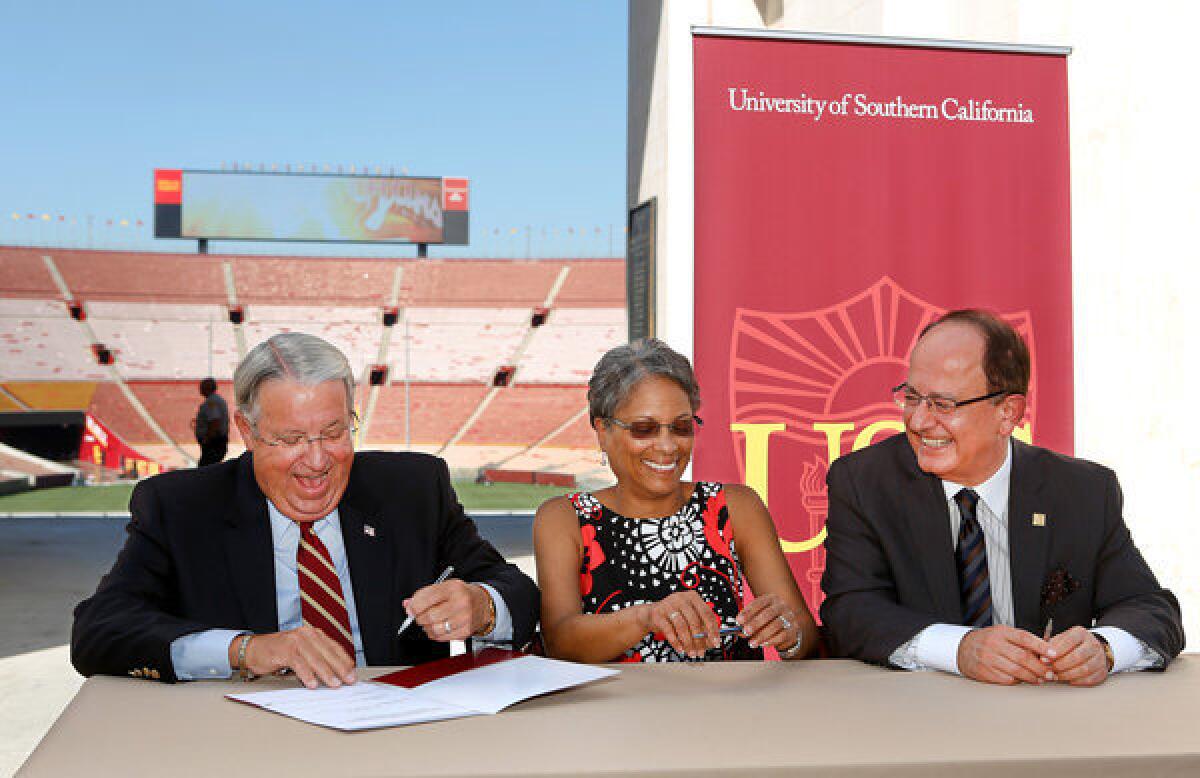Internal Coliseum emails, coarse at times, show bid to limit debate

- Share via
Internal emails obtained by The Times show Los Angeles Memorial Coliseum Commission officials trying to come up with a strategy to limit public debate on its behind-the-scenes efforts to give USC control of the stadium.
Peppered with profanities and name-calling, the emails were the subject of a recent court battle, in which the commission sought their return. A Superior Court judge refused to grant Coliseum officials an emergency order demanding that The Times and others surrender them.
In one email, then-commission President David Israel suggested the commission quickly approve the list of main points of the USC lease, known as the term sheet, during the same meeting they are made public.
DOCUMENT: Read the Coliseum emails
“I just as soon walk in the room, have someone move we accept the term sheet and instruct counsel to close the deal, take a vote and go home. How do we make that happen?” Israel wrote on Dec. 14, 2011, before the Coliseum released the term sheet.
The Coliseum’s interim general manager, John Sandbrook, responded with a recommendation that included proposed assignments for commissioners at the upcoming meeting.
“Then I suggest that you make a short introduction of the matter to be voted upon, have [Los Angeles County Supervisors] Don [Knabe] and Zev [Yaroslavsky] make the motion and the second,” he wrote.
After a brief discussion and a vote, Sandbrook continued, the panel should “then go outside and have a press conference and announce that the term sheet has been approved.”
The lease, which won final approval by the state earlier this month, gives USC control of the taxpayer-owned Coliseum and the neighboring Sports Arena for the next century. The commission decided to hand over the stadium to the private university after a corruption scandal exposed years of poor financial oversight by the panel, which is made up of three county supervisors and three appointees each from the city and state.
The 94 pages of emails were sent to The Times and 24 others, including Gov. Jerry Brown, by an anonymous source. They came with a cover letter alleging the correspondence contained evidence that the commission “blatantly violated” the state’s open-meetings law during the USC deliberations. The Ralph M. Brown Act ensures the public’s right to observe deliberations and votes of legislative bodies.
The emails show Israel using foul language in vowing to cut off fellow commissioners William Chadwick and Barry Sanders in the expected public debate before a vote on the term sheet.
He also wrote that the Chadwick had a “massive ego” and referred to City Councilman Bernard C. Parks, then a member of the Coliseum panel, as “Col. Klink,” the fictional and incompetent leader of a Nazi prison camp in the 1960s TV comedy “Hogan’s Heroes.”
Israel declined to be interviewed for this story. Chadwick and Sanders did not respond to an interview request.
Parks said Israel’s Col. Klink remark “just reflects the same classless act in an email as he is person.”
Israel wrote to Sandbrook that, regardless of whether Chadwick and Sanders opposed the term sheet, “we will have the votes at nut crunching time.”
Interim general manager John Sandbrook replied: “You are correct on the vote counting.”
Those comments were made weeks before any details of the USC lease pact were made public. A summary of the deal was released on Jan. 11, 2012.
State law generally bars officials of legislative bodies from taking action in secret, such as counting votes, that should be done publicly.
On Friday, Los Angeles County Superior Court Judge Luis A. Lavin rejected the commission’s bid for an order to have the emails returned by The Times and other recipients. The commission argued the emails contained privileged communications between the agency and its lawyers.
Lavin said the commission presented “no evidence whatsoever” in support of its claim. The judge described the request for all the emails to be returned as “grossly overbroad.”
ALSO:
California Science Center grants control of Coliseum to USC
Coliseum sued over alleged violations of open-government laws
Judge refuses demand for L.A. Times to surrender Coliseum emails
Twitter: @ronlin | @PringleLATimes
More to Read
Sign up for Essential California
The most important California stories and recommendations in your inbox every morning.
You may occasionally receive promotional content from the Los Angeles Times.















